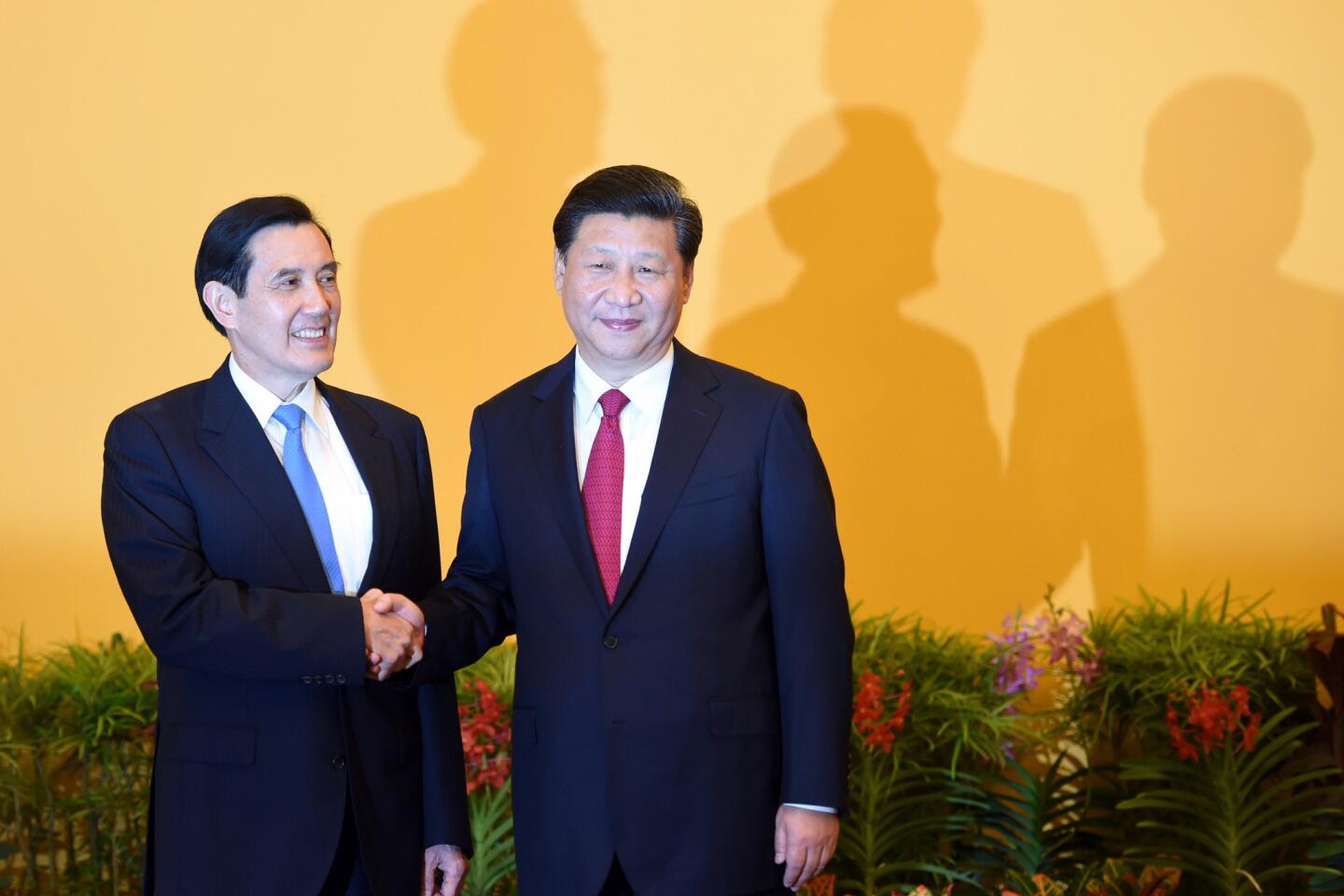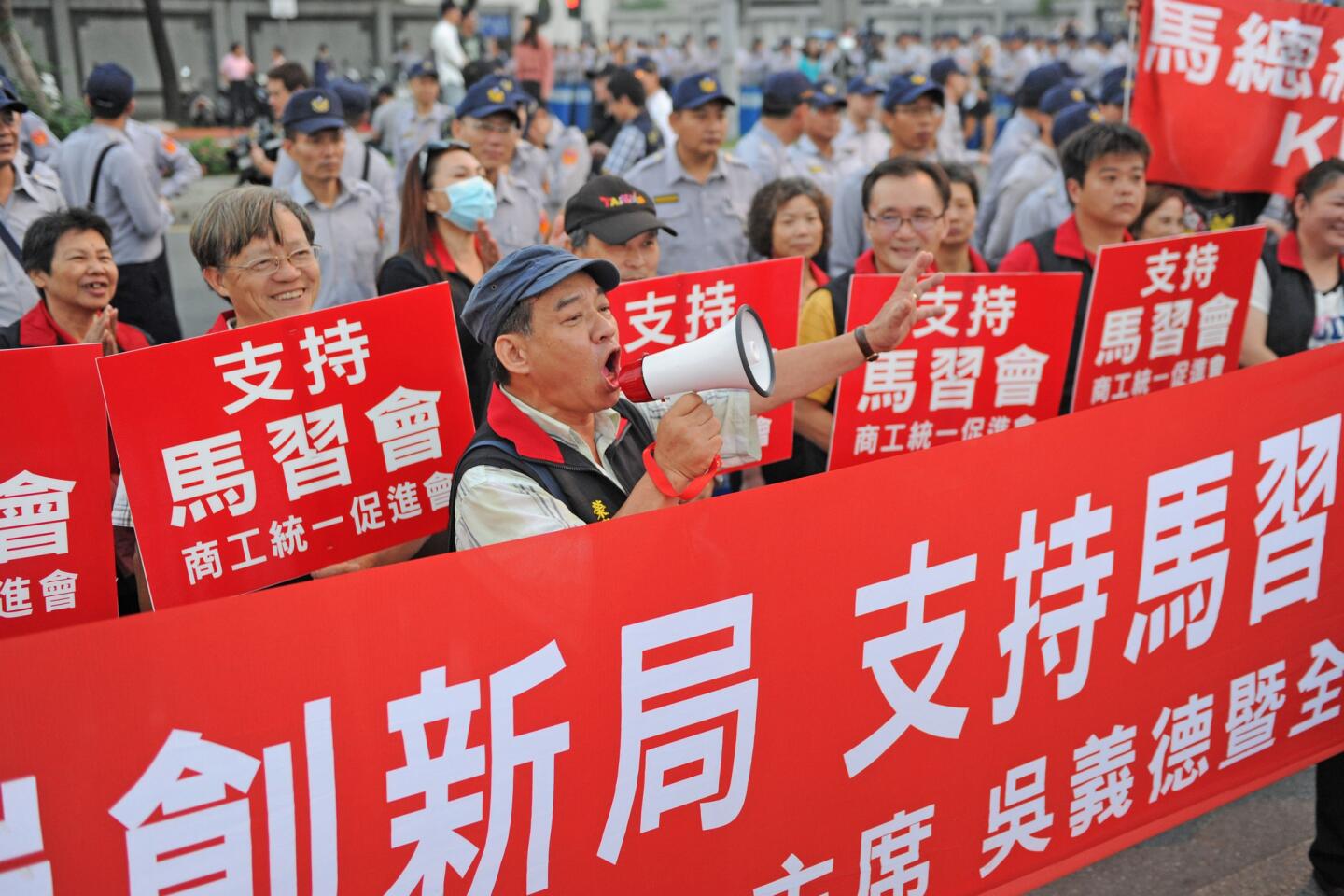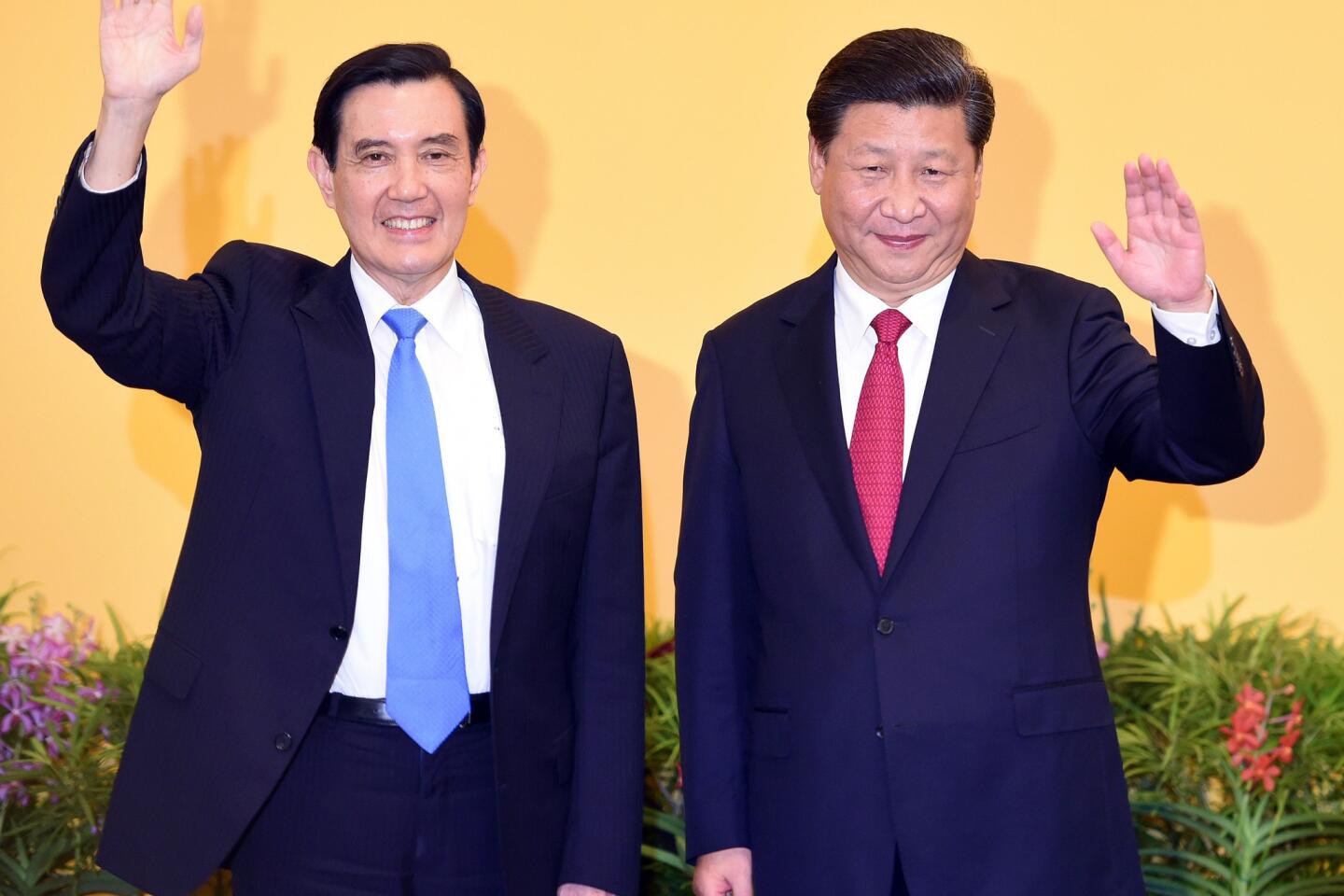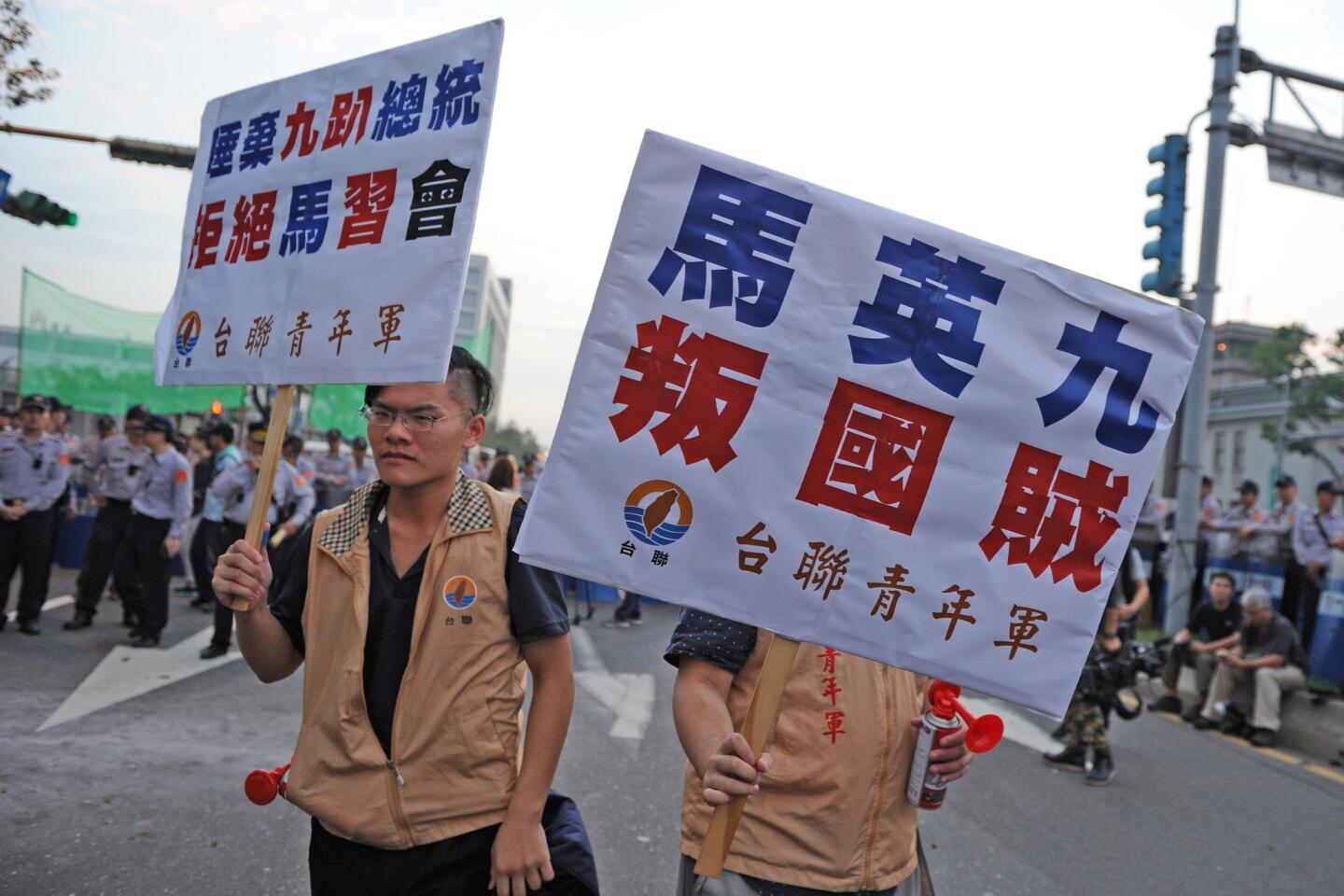Historic handshake marks meeting of China and Taiwan presidents
- Share via
reporting from SINGAPORE — Breaking with nearly seven decades of estrangement, the presidents of mainland China and Taiwan sat down for talks here Saturday -- the first such encounter between leaders of the two sides since the Nationalist Party lost the Chinese civil war in 1949 and retreated to the island.
Chinese President Xi Jinping and Taiwanese President Ma Ying-jeou convened around 3 p.m. at the Shangri-la Hotel, shaking hands and smiling broadly for a crush of cameras in front of a bright gold backdrop.
The two leaders -- who in a sign of the delicate protocol for the meeting were to address each other not as “president” but as Mr. Xi and Mr. Ma -- wore similar dark suits, with Ma in a bright blue tie and Xi in a red one.
Before holding closed-door talks, the two men read from prepared statements, with Xi speaking for about three minutes and Ma for seven. Xi called the meeting a “historic day” and referred to Taiwan and mainland China as “brothers who are still connected by our flesh even if our bones are broken.”
“We are sitting here today to prevent a historic tragedy from happening again and to keep the fruits of peaceful development between the two sides from being lost,” he added.
Taiwan has had de facto independence for the last 66 years and for decades the Nationalist-led government in Taipei regarded itself as the rightful leader of both Taiwan and mainland China, though in recent years it has dropped that position. These days, opinion surveys in Taiwan show a majority of Taiwan’s 23 million people want to maintain the democratic island’s separate status from the mainland.
Communist leaders in Beijing, meanwhile, continue to regard Taiwan as a breakaway province that must eventually be reunited with the mainland. Underscoring that, Xi told Ma: “Both sides belong to one country .... That fact and legal basis has never changed and will never change.”
Ma in his opening statement asserted that “both sides should respect each other’s values and way of life” and put forth five points in his statement, though the two sides had agreed in advance that no deals would be signed during the meeting and no joint statement released.
But opposition leaders in Taiwan voiced disappointment that Ma did not speak more forcefully.
“After watching the Ma-Xi meeting on the television, I believe that most Taiwanese are as disappointed as I am,” said Tsai Ing-wen of the Democratic Progressive Party, who has a comfortable lead over the candidate from Ma’s party heading into Taiwan’s January presidential vote. “We had hoped that President Ma would speak about Taiwan’s democracy, freedom and ... more importantly, that he would mention the freedom of the Taiwanese people to make their own choices. However, none of these were mentioned.”
After the closed-door meeting, Ma met with reporters and said he had expressed the wishes of the Taiwanese people for more latitude to operate in the international arena. Because of Beijing’s insistence that Taiwan is part of China, it has used its leverage to keep Taiwan out of numerous international organizations, including the United Nations.
Ma also said that he had expressed concerns to Xi about the deployment of missiles on the mainland side of the strait; Ma said Xi replied that they were not targeted at Taiwan.
Xi did not hold a news conference with reporters after the private meeting, instead leaving those duties to the mainland’s point man on Taiwan, Zhang Zhijun. China’s state-run CCTV did not carry coverage of Ma’s news conference.
Taiwanese journalists attending Zhang’s session expressed frustration that he only called on reporters from “friendly” news outlets, such as Taiwan’s pro-Chinese Want Times and the state-run Xinhua News Agency.
Ma in his opening remarks called for lowering the state of hostility across the Taiwan Strait, expanding cross-strait exchanges, setting up a cross-strait hotline, “cooperating to revitalize the Chinese nation” and consolidating the “1992 consensus.”
The “1992 consensus” refers, in essence, to an awkward agreement between the Nationalists and Beijing, with both sides acknowledging that there is “one China,” but that each side has its own interpretation of what that means.
“This five-point proposal is not to serve my own selfish ends but to promote the wellbeing of future generations,” Ma said.
The Xi-Ma meeting — news of which was revealed only four days ago — has sparked a wave of disparate reactions. Some observers have labeled it as historic as President Richard Nixon’s 1972 trip to China, which paved the way for Washington and Beijing to restore diplomatic relations; others have denounced it as a self-serving ploy by Ma to burnish his legacy and give a boost to his party’s election prospects just two months before Taiwanese voters go to the polls to select a new president.
Ma has pushed closer relations between Taiwan and the mainland during his two terms in office, opening direct flights across the 100-mile Taiwan Strait and signing nearly two dozen economic agreements. But in the last two years, a backlash toward Ma’s mainland policies has developed in Taiwan, particularly among younger voters, many of whom say closer cooperation could threaten Taiwan’s democracy and has not brought the promised economic rewards. Ma cannot seek reelection due to term limits.
On Saturday afternoon in Taipei, about 400 people protesting against Ma’s move to meet Xi made speeches and waved banners on a barricaded, police-guarded street in front of the economics affairs ministry. Then they marched through central Taipei streets to the presidential office.
Some carried banners that said “Ma Ying-jeou betrays Taiwan” and “Secretive Ma-Xi Meeting, Nationalist-Communist Sell-out Taiwan Meeting.”
“Ma is Xi Jinping’s chess piece,” said protester Tai Bi-yan, 60. “They’re going to use Ma Ying-jeou. There’s no contribution to us. You look at China, how big they are, they’re going to take over the world, that’s how powerful they are. You have business being done in secret and the people don’t know what they’re doing.”
But some mainlanders expressed elation over the tete-a-tete. Gao Yidi, 70, from Fujian province, who was visiting his daughter in Singapore, said he was over the moon about the day’s events.
“I feel so emotional to see the leaders walking together — I never thought I would see it in my lifetime. I have some relatives in Taiwan and they also hope for reunification .... We are of the same roots.”
His daughter, Gao Xuehong, 30, echoed her father’s sentiments. “I feel as emotional as my father,” she said. “It’s a very moving day for us, there is lots of hope and expectation for Chinese people today.”
Staff writer Makinen reported from from Beijing and special correspondent Lee from Singapore. Special correspondent Ralph Jennings in Taipei contributed to this report.
ALSO
How China and Taiwan split: A look back, as leaders meet
L.A. leaders warn Angelenos to prepare for ‘Godzilla’ El Niño storms
Why huge ‘SNL’ ratings won’t help Donald Trump become president
More to Read
Sign up for Essential California
The most important California stories and recommendations in your inbox every morning.
You may occasionally receive promotional content from the Los Angeles Times.

















